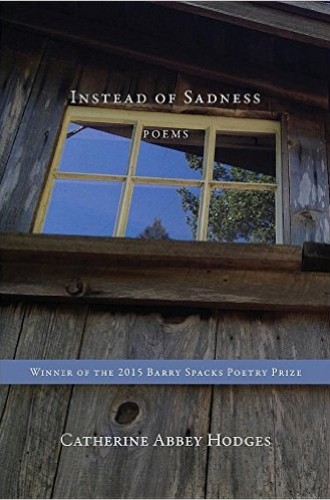Ordinary grace
Most of us have been hijacked by loss or waylaid by grief at some point or another. We have lost someone we love. We have needed to give up some dream. We have failed at some goal. In our relentlessly active, entertainment-driven American society, we often shoulder our grief alone.
In her first collection of poetry, Catherine Abbey Hodges makes it clear that she too knows the deep ache of loss. Like William Blake in his Songs of Experience, Hodges could say plenty about the adult world of repression and defeat. Instead, she pits against grief such a sensible beauty that the book finally releases her—and, as we read, us—from the grip of sorrow. Hodges’s poetry bears witness to the possibility of joy after despair.
Read our latest issue or browse back issues.
In “Everything Important” she tells us: “Friends up and leave / their sturdy bodies. The stonechat takes flight. / A son learns to whistle. A daughter finds / the greatest common factor, then falls / in love. One morning the leaves / are off the elm and halfway down the block.” There is nothing she, or any of us, can do to stop our dearest people and things from fading, dying, moving on, leaving us. She—and we, her readers—stand waving goodbye, stunned, grief-stricken. And yet, when Hodges turns, she glimpses “the secret alley of camellias” bathed in an “impossible . . . brightness.”
Another poem, “January Song,” takes place after Christmas, when Hodges feels abandoned to primal darkness. “The holidays are over. Now we’re here / amidst the candle stubs and bits of ribbon,” she writes. The kids have packed their gear and driven away. As she and her husband wave to them from the porch, she realizes that “Time’s origami has its way with fear, / with loss, bright things gone dark and plans gone riven.” The form of this poem is a villanelle, which repeats whole lines. It dwells pensively on loss. Yet by the end she reports, “our failures folded into something dear / and strange and new.” In fact, she can claim, “These early afterhours are their own heaven.”
What might make an anguished reader believe Hodges’s claim that healing and even joy are possible? I found myself believing her because of the poems’ stripped-down diction and straightforward images. The reversals in this book aren’t easy. There is nothing sentimental or giddy about them. They are real. They are ordinary.
Hodges’s poems locate grace in the simplest things. In “Turned Sparrow” Hodges tells us that when she sees smoke tear “from stacks like rags” she remembers her own birth: “me torn clear like a leaf / turned sparrow in a hard wind.” Here she identifies with the familiar—an autumn leaf in a fierce gale, and a sparrow, a bird no bigger than a child’s fist and utterly common.
Poets have long compared themselves to birds, those simple mysterious creatures who hover between heaven and earth. The great English Romantic John Keats likened himself to a nightingale, a pure, idealized voice singing alone in darkness. In contrast, Hodges is an ordinary sparrow. She has experienced the effort and terror of struggling to make headway against a hard wind. She testifies at the end of the poem that it takes work and steady nerves to find something “instead of sadness,” but sometimes the light comes. Then, in a flash, we see that light as a gift of grace.
Her short poem “Polaris” links the North Star, the brightest star of Ursa Minor, with a nasturtium leaf. At their intersection, “here the heavens / pivot.” Here again, Hodges finds beauty in the ordinary. Nasturtiums are humble flowers (unlike lilies, with their history of religious symbolism, or roses, which have long represented love). Nasturtiums are widely available and easy to grow: they cheerfully spread. They are edible; they are practical. And yet, in Hodges’s poetry, each leaf of this common, useful little flower bears the mark of the most dazzling star of the heavens. The ordinary is suffused with grace.
After reading Hodges’s poems I find myself paying attention to the crazy angles of a sycamore’s bare limbs, marveling at its paint-by-number bark. I noticed this morning how the green heads of daffodil leaves are nudging aside last year’s brown rubble in the flower bed by the driveway. As Hodges tells us in “Stems,” frequently our tired spirits and exhausted questions are transformed by the most modest things around us. The earth is always “delivering answers / that look for all the world / like cornflowers.”
If I forget that, and I’m pretty sure I will, I plan to go back and reread this redemptive book.





